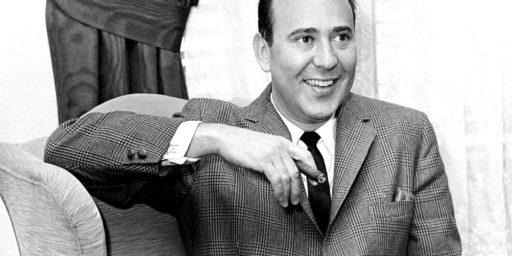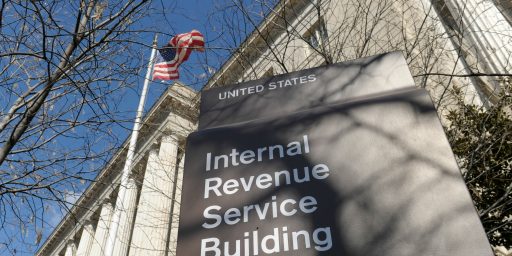Further Thoughts On The Fifth Amendment And Lois Lerner’s Supposed Waiver Of Privilege
Darrell Issa's Committee seems headed for a battle over the Fifth Amendment.
There have been new developments regarding the testimony of IRS employee Lois Lerner, who asserted the protections of the Fifth Amendment when she was called to testify before the House Government Oversight Committee yesterday. Today, Chairman Darrell Issa said that he intends to recall her to testify before the committee despite the fact that she has invoked her right not to testify pursuant to the Fifth Amendment:
WASHINGTON (Reuters) - Republican Representative Darrell Issasaid on Thursday he will call Internal Revenue Service official Lois Lerner back to testify before his committee on the IRS-Tea Partyscandal after she asserted her constitutional right not to answer questions.
“We are obligated to bring Lerner back because she did not properly take the Fifth (Amendment),” Issa said.
“She clearly chose to make her statements and then not open herself up to even any questioning as to the statement she made,” said Issa, chairman of the House Oversight and Government Reform Committee.
I addressed the issue of whether Lerner had waived her testimony yesterday, and while there has been some legal commentary since then from others arguing that her opening statement may indeed have constituted at least a partial waiver of her rights, it strikes me unlikely that this is going to go anywhere. For one thing, if Lerner is indeed brought back before the committee without a grant of immunity, and indeed all of this could just be public posturing as the parties negotiate an immunity agreement behind the scenes, then she is obviously going to continue to assert her Fifth Amendment rights regardless of whatever position Issa or any of the other members of the committee have to say about it. This means that the committee will have two choices, either they let it slide or they vote to hold her in contempt. If they go that route, then the House as a whole will also have to hold her in contempt, at which point the matter would be referred to the Justice Department. Even assuming that the Justice department agrees to prosecute, they’re going to have to convince a Federal Judge that Lerner has in fact waived her rights. I would submit that’s going to be difficult.
Orin Kerr examined the issue in a post at The Volokh Conspiracy last night:
The tricky part is how to characterize Lerner’s testimony before she invoked the Fifth Amendment. On one hand, if you say that Lerner merely expressed her view that she is innocent but did not actually testify as to any facts, then you could say she did not waive her rights with her statement. Questioning would not be about the details of facts she already testified to, but rather would require her testimony on a subject she declined to testify about. On the other hand, if you say that Lerner’s reciting the allegations and then denying them effectively testified about the allegations, then you could say that she did testify and did waive her rights. From that perspective, she already testified about “the subject” by saying that she did not violate any IRS rules or submit false testimony, and further questioning would be about the details of why she thinks that.
I’m not enough of a Fifth Amendment nerd to have strong views on which side is right. So I posed the question earlier today (based on press reports of what Lerner said, not the full transcript) to a listserv of criminal procedure professors that includes some serious Fifth Amendment experts. Opinions were somewhat mixed, but I think it’s fair to say that the bulk of responders thought that Lerner had not actually testified because she gave no statements about the facts of what happened. If that view is right, Lerner successfully invoked her Fifth Amendment rights and cannot be called again. But this was not a unanimous view, it was not based on the full transcript, and there are no cases that seem to be directly on point. So it’s at least a somewhat open question.
Given that it’s an open question, it seems highly unlikely to me that a Federal Judge is going to rule that Lerner waived her Fifth Amendment rights in any respect by making a brief, entirely generalized, statement to a Congressional Committee at a hearing to which she was subpoenaed before formally invoking her Fifth Amendment rights. Admittedly, it would have been preferable for her to remain silent altogether, but it doesn’t seem to me that what she did comes even close to being sufficient to constitute a waiver.
One possible clue to where the courts might be on this issue can be found in a short unanimous opinion from the Supreme Court in a case called Ohio v. Reiner 532 U.S. 71 (2001). In that case, Reiner was charged with involuntary manslaughter in the death of his infant son from what the prosecution contended was “shaken baby syndrome.” At trial, Susan Batt, the child’s babysitter refused to testify relying on her rights under the Fifth Amendment and was granted immunity under applicable Ohio law. Batt then went on to testify that she had only asserted the privilege on advice of counsel and went on to maintain her innocence. The Supreme Court of Ohio reversed Reiner’s conviction on the ground that Batt had no valid Fifth Amendment right because her testimony could not have incriminated her. The Supreme Court of the United States reversed that decision, and in the process made a point about the Fifth Amendment privilege that strikes me as being especially applicable to the situation we’re presented with here:
We have held that the privilege’s protection extends only to witnesses who have “reasonable cause to apprehend danger from a direct answer.” Id., at 486. That inquiry is for the court; the witness’ assertion does not by itself establish the risk of incrimination. Ibid. A danger of “imaginary and unsubstantial character” will not suffice. Mason v. United States,244 U.S. 362, 366 (1917). But we have never held, as the Supreme Court of Ohio did, that the privilege is unavailable to those who claim innocence. To the contrary, we have emphasized that one of the Fifth Amendment’s “basic functions … is to protect innocent men … ‘who otherwise might be ensnared by ambiguous circumstances.’ ” Grunewald v. United States, 353 U.S. 391, 421 (1957) (quoting Slochower v. Board of Higher Ed. of New York City, 350 U.S. 551, 557—558 (1956)) (emphasis in original). In Grunewald, we recognized that truthful responses of an innocent witness, as well as those of a wrongdoer, may provide the government with incriminating evidence from the speaker’s own mouth. 353 U.S., at 421—422.
The Supreme Court of Ohio’s determination that Batt did not have a valid Fifth Amendment privilege because she denied any involvement in the abuse of the children clearly conflicts with Hoffman and Grunewald. Batt had “reasonable cause” to apprehend danger from her answers if questioned at respondent’s trial. Hoffman, supra, at 486. Batt spent extended periods of time alone with Alex and his brother in the weeks immediately preceding discovery of their injuries. She was with Alex within the potential time frame of the fatal trauma. The defense’s theory of the case was that Batt, not respondent, was responsible for Alex’s death and his brother’s uncharged injuries. In this setting, it was reasonable for Batt to fear that answers to possible questions might tend to incriminate her. Batt therefore had a valid Fifth Amendment privilege against self-incrimination.
In the case before us, all we have from Lerner is, as I said, a generic opening statement.
While the Reiner case is admittedly not fully on point, and it doesn’t entirely address some of the arguments that those arguing in favor of waiver have made, however, it does raise an important point that may end up being relevant here. In the end, all that Lerner’s statement constitutes is a declaration of her own innocence. Given that, the Reiner Court’s holding that the Fifth Amendment privilege still applies to people who claim to be innocent strongly suggests that she did not waive her rights merely be making a statement in which she states that she is innocent.. Indeed, to the extent there is any doubt on this issue I would expect that a judge is going to err on the side of protecting her rights at this stage, especially given the fact that this is a Congressional hearing and not a Grand Jury proceeding or criminal trial and the fact that there is an ongoing FBI investigation of this matter of which Lerner is likely to be, at the very least, a person of interest. A finding that Lerner waived her rights in this Committee hearing would, potentially, prejudice her ability to assert those rights in a law enforcement interrogation.
There will be more to come on this I am sure, but I submit that the default rule of erring on the side of liberty is one that people examining the issue would do well to apply.






@Doug Mataconis: Serious question: what is the difference between what she said and “Not Guilty, Your Honor.”? The latter is obviously permitted without waiving one’s Fifth Ammendment
WrightsRights.John,
Effectively, I don’t think there’s any difference for Fifth Amendment purposes
Who wants to bet those will be party line votes? Who wants to bet the GOP demands an independent prosecutor?
IMO they should grant her immunity from prosecution and then demand that she testify.
@Dave Schuler:
As I’ve noted elsewhere, all of this back and forth we’re seeing may just be bluster for public consumption while the parties negotiate a testimonial immunity deal behind the scenes. In my estimation, if she receives immunity for her testimony, she’ll testify.
Makes me long for the good ole’ days…
@John D’Geek:
I think those in favor of waiver are arguing that the difference is that she was sworn in, so what she said after that was ” testimony”.
I think Congressional practice should play a role in determining whether this was a waiver. My understanding is that there have been other episodes in which a witness made an opening statement avowing innocence. They were never held to have waived their Fifth Amendment right.
I agree with Doug here, but Alan Dershowitz thinks she waived her right. It’s not an open and shut question.
Going forward, I think counsel is going to advise that witnesses before Congress make no opening statements at all, but simply take the Fifth.
She could have answered 20 questions and made a dozen statements before invoking her 5th Amendment Right.
This is just more nonsense from Issa…a conspiracy theorist on the level of Jenos Indiana Jones…and he has made it his quest to find something, anything, on Obama.
A total waste of taxpayer money from alleged fiscal conservatives.
Every single piece of evidence that comes out further undercuts the conspiracy theory.
Yet down, and down, we go. Oh wait…this is a rabbit hole? Who knew?
@Sam Malone:
You really should catch up on the legal discussion of this.
You can decide to remain silent at any point when being interrogated by investigators. But if you decide to give testimony, you are waiving your right to remain silent for cross-examination on the facts of that testimony. There are boundaries so they can’t go outside what you testified to but by testifying you agree to cross examination on the facts you asserted.
Now, as she asserted not her innocence but that she committed no crime or broke no regulations, then that seems a bit general. On the other hand, if later she is found to have knowingly committed a crime or broken a regulation, then she did just lie to Congress under oath. And really, these days, who can truthfully say they’ve not broken any law? Plus she said she’s done nothing wrong. Who can really believe that? Everyone does something wrong, especially in this time of overwhelming government laws and regulations.
@Dave Schuler: It seems the Lerner problem is complicated by the fact that they want her to explain what happened, plus explain why her previous testimony contained apparent falsehoods. I think if it was just the former, then an immunity agreement would be reached. At this point, I imagine they want to see if they can find the information from other IRS personnel first.
If Lerner does not resign, other IRS personnel are likely to complicate matters by pleading the Fifth as well.
What is the investigation about? I thought it was about whether she intentionally misled the committee about the existence of the investigation requested by the committee.
@rudderpedals:
The FBI investigation is ostensibly about the political targeting at the IRS and whether any crimes were committed
Yes JKB…what you and Darrell Issa think supersedes the Constitution.
Thank you for your legal expertise.
I think Doug’s right on the non-waiver. The justification for waiver is usually that the factfinder would be misled without the cross examination that equity now requires because rules of evidence. But this isn’t a criminal proceeding, there’s no double jeopardy issue, there’s hardly an objective factfinder involved. The equities aren’t here.
Dershowitz is my takeaway from this so far. Minimize risk and advise the client to politely assert his right to remain silent. Counsel can offer to read any opening statement.
There’s a fairly strong argument that Lerner delved into the subject matter and did waive. Of course, there will be plenty of liberal judges and liberal journalists who will want to help her hide what she knows.
@jim: So anyone who doesn’t agree with you is by definition a liberal activist who puts party ahead of anything else?
Gotta tell you, this says a lot more about you than it does about any “liberals.”
@rudderpedals:
I don’t know what to say about Dershowitz. I don’t deny he’s a smart guy and an experienced attorney. Smarter and more experienced than I am. But, his legal analysis of late seems to have gone off in weird directions that seems more designed to get him press attention than be insightful, never mind accurate.
That’s just my opinion.
@Doug Mataconis:
No, Doug, you’re completely right about that. He’s a former professor of mine, and I’ve been watching his drift over the last ten or so years with some concern.
Allen Dershowitz probably the most knowledgable constituional professor in the country he just said you do not know what you are talking about.Lois Lerner absolutley waived her fifth amendmendt rights by making the statement she did .The venue does not matter according to Dershowitz,she is in shit load of legal trouble.You need to go back to law school !
What’s hundreds of thousands of dollars in student loan debt going to teach Doug? Not to listen to commentors?
Dershowitz is obviously a very smart guy. It’s also obvious that he has an agenda, and that his utterances have to be taken with a grain of salt.
Listening to Alan Dershowitz is a waste of time. Yes, he is intelligent. He is also an idiot.
@OzarkHillbilly: And yes, “Intelligent idiot” is not an oxymoron.
@OzarkHillbilly:
Like a lot of people Dershowitz crapped his pants on 9/11 and been going down hill ever since. Many have since realized the silliness of their ways and admitted it.
Dersh just doubled down.
I always thought the fifth was invoked when asked a question. When did it change to allow people not to even show up?
@cmorholt: No, she had to show up. And she headed off the questions with the 5th assertion.
What’s questionable is her statement before invoking it. Veteran criminal prosecutor Patterico says he would have followed up her statement with questions directly related to what she did say:
She opened the door, after all.
And there’s nothing in the 5th Amendment that says she can’t even be asked, just that she can’t be compelled to answer. It would have been entertaining to keep her there and ask her those and other questions, forcing her to repeat her assertion over and over and over again.